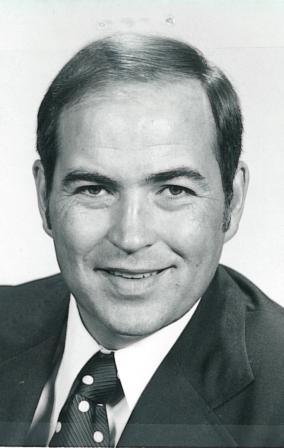Two more excerpts from the files of the late Lou Hyndman come from the mid 1970s. The disputes being addressed by senior political leaders followed soon after the OPEC oil embargo. The conflict which emerged between Ottawa and the consuming provinces (e.g. Ontario) and Alberta involved a bitter fight over which order of government would collect the lion’s share of the rapid increase in the world price of oil.
The first excerpt is from a speech given by the then Treasurer, Gordon Miniely at a finance ministers’ conference.
The second extract is from a speech, presumably authored, by J.Peter Meekison, a special intergovernmental affairs advisor and then deputy minister of Alberta’s Federal and Intergovernmental Affairs department dated in December 1974. The speech is significant as it presages clearly the importance of resource jurisdiction to Alberta.
Gordon Miniely, Provincial Treasurer- 1975 Finance Ministers conference
Your budget proposals, Mr. Chairman, raise the share received by the federal government and all Canadians to $4.4 billion or nearly 50% of the total amount of $9.3 billion. The producing provinces, the owners of the resources, are left with only 25% and the industry receives the balance. Alberta alone is giving up in the order of $3.7 billion in the interest of all Canadians, $2 billion more than we receive as owners of the resources. It is preposterous for you to ignore export tax revenues of $1.5 billion when you purport to give the distribution of revenue shares.

???????????????????????????????
September 10 1971- April 2, 1975
Source: Legislative Assembly of Alberta
The numbers which I have used above are for the total Canadian oil and gas industry. If we consider the distribution of the proceeds of a barrel of crude oil produced in Alberta valued at international prices, the results are even more dramatic. On that basis, the federal government, and Canadian consumers claim 55% which is double the 27% share received by Alberta and three times the share going to the industry. When considering aggregate revenues collected by both governments, our average effective royalty rate on crude oil is only 22%.
Source: Provincial Archives of Alberta, PR 1986.0245 , Box #8, File #74 (Hyndman papers)
5/12/74 JPM/hk pp. 8-9- J.Peter Meekison- Lougheed speech given at First Ministers’ Conference
In summary it would appear from the above that the federal government is determined to maintain its budgetary provisions. Nevertheless, the prime minister is well aware that a new price agreement will need to be negotiated in the new year. One could hypothesize that the federal saber-rattling is designed more to influence the upcoming negotiations rather than alter an existing agreement. If one considers the Petroleum Marketing Bill in this equation one could also put forward the hypothesis that the federal government is concerned about preserving its dominant role in relation to the economy. Under the BNA act, as it was drafted, one of the central concerns of the framers was the economic supremacy of the national government. From then to today this concern remains and it undoubtedly affects federal thinking. With the enormous wealth being generated by the sale of this province’s resources, the balance of economic power in Canada may shift. Since this has happened suddenly and dramatically it has caught the federal government by surprise and they are reacting on several fronts without really considering the full implications of either their pronouncements or their policies. Using this line of argument one can see why a single resource is being regulated.
Source: royalroads.ca
A final thought is that the energy dispute and all of its constitutional ramifications is one issue which may be discussed during any future constitutional negotiations. One must recall the Prime Minister’s speech on October 2nd, 1974. It should not be ignored when one considers the constitutional overtones involved in this dispute. This is particularly true if one considers Senator Forsey’s remarks concerning disallowance, etc. If one adds this suggestion to the list of issues discussed between 1968 and 1971, and one or two other items such as communications, one can see a position being developed by the federal government for renewed discussions on the Constitution.
Source: Provincial Archives of Alberta, PR 1986.0245, Box #8, File #74 (Hyndman papers)
